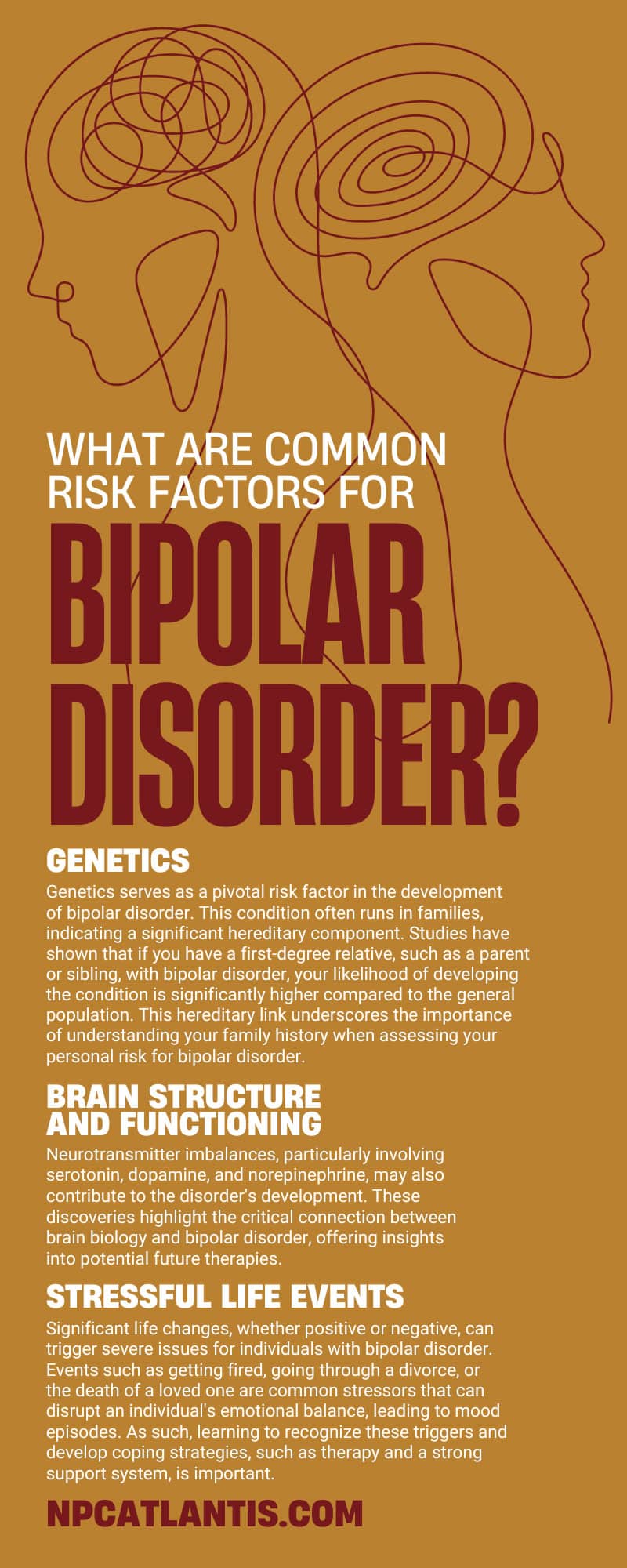Bipolar disorder is a complex mental health condition affecting millions of people worldwide, characterized by significant and often unpredictable shifts in mood, energy, and activity levels. These fluctuations can severely impact daily life, making it crucial to understand the potential causes and risk factors associated with the disorder. Although the exact cause of bipolar disorder remains elusive, research has identified several common risk factors for bipolar disorders, factors that might increase someone’s likelihood for developing the condition.
Genetics
Genetics serves as a pivotal risk factor in the development of bipolar disorder. This condition often runs in families, indicating a significant hereditary component. Studies have shown that if you have a first-degree relative, such as a parent or sibling, with bipolar disorder, your likelihood of developing the condition is significantly higher compared to the general population. This hereditary link underscores the importance of understanding your family history when assessing your personal risk for bipolar disorder.
Environmental Triggers
Environmental factors can significantly impact the onset and progression of bipolar disorder. Certain triggers can precipitate the manifestation of bipolar symptoms in people, triggers such as:
- Stressful life events
- Substance abuse
- Disrupted sleep patterns
Stressful situations, whether they are related to work, relationships, or health, can exacerbate existing symptoms or lead to a new episode. Thankfully, when you’re aware of these triggers, you can take preventative measures such as stress management techniques to minimize their impact.
Brain Structure and Functioning
Ongoing research has highlighted differences in brain structure and functioning among those with bipolar disorder compared to those without the condition. Studies using imaging techniques have identified structural differences in certain brain areas involved in mood regulation and impulse control.
Neurotransmitter imbalances, particularly involving serotonin, dopamine, and norepinephrine, may also contribute to the disorder’s development. These discoveries highlight the critical connection between brain biology and bipolar disorder, offering insights into potential future therapies.
Childhood Trauma
Experiencing traumatic events during childhood has been linked to an increased risk of developing bipolar disorder later in life. Traumatic experiences can have long-lasting effects on mental health. Some of these experiences include:
- Physical or emotional abuse
- Neglect
- Witnessing violence
The stress and emotional turmoil from such events can contribute to the development of mood disorders by affecting brain development and stress response systems. Understanding this link can help in mitigating bipolar disorder’s severity by providing appropriate therapies and coping strategies from an early age.
Stressful Life Events
Significant life changes, whether positive or negative, can trigger severe issues for individuals with bipolar disorder. Events such as getting fired, going through a divorce, or the death of a loved one are common stressors that can disrupt an individual’s emotional balance, leading to mood episodes. As such, learning to recognize these triggers and develop coping strategies, such as therapy and a strong support system, is important.
Substance Abuse
Substance abuse is prevalent among individuals with bipolar disorder. However, substances such as alcohol and drugs can often exacerbate bipolar symptoms, leading to more frequent and severe mood episodes on top of the other issues they bring. Substance abuse also increases the risk of developing bipolar disorder. The addressing and management of substance abuse is a key part of treatment, requiring integrated care that tackles both the mood disorder and addiction simultaneously.
Age
Another risk factor of bipolar disorder is age. Bipolar disorder typically emerges in late adolescence or early adulthood, often coinciding with significant life changes, such as transitioning from school to work. However, the disorder can appear at any age, with symptoms potentially varying depending on when it first manifests. Early intervention is key, as recognizing and treating symptoms promptly can improve long-term outcomes and quality of life for everyone.
Medical Conditions
Some medical conditions, such as thyroid disorders and multiple sclerosis, have been linked to an increased risk of developing bipolar disorder. These conditions can affect brain function and mood regulation, potentially exacerbating bipolar symptoms or contributing to their development. Medical evaluations are essential for people with potential bipolar symptoms, ensuring that people can address all the contributing factors in their respective treatment plans.
Medication Use
Certain medications used to treat other mental health conditions, such as antidepressants, can increase the risk of developing bipolar disorder in predisposed individuals, especially without the right mood stabilizers. Monitoring medication side effects is crucial in managing the onset and progression of bipolar disorder. Work with healthcare providers to find the right medication regiment to combat this increased risk, and make the necessary adjustments when needed.
Seasonal Changes
Changes in seasons can trigger mood disturbances in individuals with bipolar disorder. This phenomenon is known as seasonal affective disorder (SAD). For example, some people experience more manic episodes during the summer months and more depressive episodes during the winter. This pattern underscores the importance of seasonal awareness in symptom management, encouraging individuals to develop proper strategies, such as using light therapy or adjusting medication doses.
Lifestyle Factors
Poor lifestyle habits, including lack of exercise, unhealthy eating, and insufficient sleep, can also increase the risk of developing bipolar disorder and exacerbate existing symptoms. Maintaining a healthy lifestyle by engaging in regular physical activity, following a balanced diet and proper sleep, can play a significant role in managing symptoms and improving overall well-being.
Family Dynamics
Growing up in a family with high levels of conflict or instability may contribute to the development of bipolar disorder. Family dynamics can influence stress levels and emotional well-being, potentially triggering or worsening mood episodes. Understanding these dynamics can help people seek supportive environments and therapy, reducing the risk of exacerbating bipolar disorder symptoms.
Lack of Support Systems
Having a robust support system is vital for managing bipolar disorder. Individuals without the support of family or friends may face an increased risk of developing the condition or experiencing more severe symptoms. Support systems, whether they’re individuals or groups, are a key part of treatment plants, providing emotional support and practical assistance, both for people at risk of bipolar disorder and those already experiencing it.
Bipolar disorder does not stem from a single cause. Instead, there are many common risk factors for bipolar disorder, variables that influence people to develop this condition. Thankfully, when you understand these factors and take proactive steps to manage them, individuals can better cope with the challenges of living with bipolar disorder.
Seeking professional treatment is also important, and if you’re in Atlanta, The Neuropsychiatric Clinic can help. Our Atlanta bipolar disorder treatments can help you or your loved ones learn to manage their condition in a more holistic way. Support, understanding, and effective management strategies are crucial in navigating the complexities of this challenging condition.

